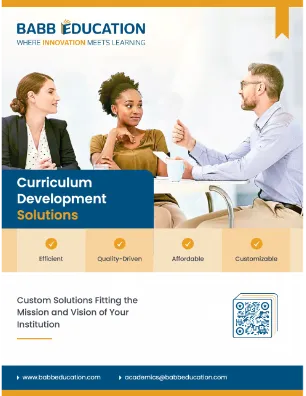Some are resistant due to concerns about academic integrity, lack of in-person engagement, and/or unfamiliarity with online teaching tools. Instructional designers and university administrators, working with faculty who are hesitant about online education need patience, communication, and strategic support. As the Director of eLearning for Babb Education, I can share some common reasons for faculty resistance, effective strategies to address concerns, and best practices for encouraging a positive transition to online teaching.
Why Are Some Faculty Resistant to Online Education?
In our experience of working with faculty, we have encountered a range of concerns that contribute to resistance toward online education. Understanding and responding to these concerns has been key to helping instructors transition more comfortably into digital learning environments. One of the most common concerns is the perceived lower quality of online learning. Many faculty members worry that online courses lack the depth, rigor, and/or engagement of traditional face-to-face instruction. Some believe that student learning outcomes are weaker in an online environment, leading to skepticism about the effectiveness of digital education.
Another significant factor is the fear of losing control over course design. In a traditional classroom setting, instructors have full autonomy over their lectures, discussions, and assessments. However, when courses are moved online, especially within structured course templates or in collaboration with instructional designers, some faculty feel they are losing their ability to shape the learning experience according to their teaching style and preferences. We have also seen that a lack of familiarity with online tools can be a major barrier. Many faculty members have spent their entire careers teaching in-person and may not feel comfortable using learning management systems (LMS), video conferencing platforms, or other digital tools. The idea of mastering new technologies, particularly under time constraints, can be overwhelming and intimidating.
Additionally, concerns about student engagement and interaction often arise. Some faculty worry that online education reduces meaningful interactions between students and instructors, leading to passive learning. Maintaining discussion quality, fostering collaboration, and ensuring active participation can certainly feel more challenging in a virtual space. Another major concern is workload and time constraints. The transition from face-to-face instruction to online teaching requires significant time and effort. Many faculty members fear that developing an online course, particularly in the initial setup phase, demands far more work than a traditional course, adding to their already heavy workload.
Lastly, skepticism about academic integrity is a recurring issue. Faculty often express concerns about cheating and plagiarism in online assessments. Without the ability to proctor exams in person, many instructors struggle with designing assessments that minimize dishonesty while still effectively measuring student learning.
By recognizing and addressing these concerns, we have been able to support faculty in making a smoother transition to online education. Providing professional development, instructional design support, and evidence-based strategies has helped many instructors overcome their initial resistance and embrace the opportunities that online learning offers.
Strategies for Working with Resistant Faculty
Many instructors have valid concerns about student learning, workload, and course quality. To help faculty adapt, Babb Education takes a thoughtful and supportive approach, implementing a range of strategies designed to make the shift to online course development and instruction smoother and more manageable.
One of the most effective strategies is to acknowledge concerns and provide reassurance. Faculty resistance often stems from a deep commitment to student success, and it is important to validate their worries rather than dismiss them. Sharing research studies, institutional success stories, and student feedback can help demonstrate that well-designed online courses can achieve strong learning outcomes. By presenting data and concrete examples, we have helped many faculty members realize that online education is not inherently inferior but rather a different mode of instruction that can be just as rigorous and engaging for students.
We have also found that offering personalized support and training is far more effective than a one-size-fits-all approach. Faculty members have varying levels of experience with technology and online teaching, so tailored support is crucial. One-on-one consultations with instructional designers and hands-on workshops focused on specific tools, such as learning management systems, discussion boards, and online assessments, can significantly increase faculty confidence. Providing resources like video tutorials, step-by-step guides, and frequently asked questions ensures instructors have ongoing support when they need it.
Another key factor is course development assistance. Many faculty members are open to online teaching but lack the time or expertise to design a strong course. We have helped alleviate this burden by offering instructional design support, creating course templates that align with best practices, and integrating multimedia and interactive elements. Additionally, helping faculty scaffold learning and structure assessments to maintain academic integrity reassures them that their online courses can be just as rigorous as their in-person counterparts. When faculty understand they don’t have to build an online course alone, their resistance often decreases significantly.
A major shift in perception occurs when faculty begin to see pedagogical best practices as opportunities rather than technological challenges. We emphasize teaching strategies that enhance engagement, such as active learning techniques (e.g., case studies and interactive learning activities), frequent low-stakes assessments, structured discussion forums, and a balance of synchronous and asynchronous elements. When instructors realize that online teaching can complement and even enhance their traditional methods, they are more open to exploring digital education.
Academic integrity concerns are another major hurdle. Many faculty members worry about cheating in online courses, and addressing this issue directly can alleviate their fears. We guide faculty in designing open-ended, application-based assessments rather than relying solely on multiple-choice tests. We also introduce plagiarism detection tools like Turnitin, proctoring solutions for high-stakes exams, and authentic assessment strategies such as portfolios, group projects, and reflective journals. When faculty see that online assessments can be both secure and meaningful, they typically feel more confident in the transition.
Fostering a community of practice has also proven invaluable. When faculty see their colleagues succeeding in online education, they are more likely to give it a try. We encourage institutions to create faculty learning communities where instructors can share experiences, host roundtables, and participate in peer observation programs. Additionally, co-developing courses and exchanging best practices help build a culture of collaboration rather than isolation.
Faculty resistance to online education is often rooted in legitimate concerns about quality, workload, and engagement. By addressing these concerns with empathy, support, and practical solutions, Babb Education has helped dozens of faculty overcome their initial resistance and discover the potential of online education. With the right support, training, and encouragement, instructors can transition to digital teaching in a way that maintains their academic integrity, enhances student engagement, and aligns with their teaching philosophy.Top of FormBottom of Form
Contact Babb Education today to discover how we can help your faculty embrace the opportunities of online education with confidence and success!


